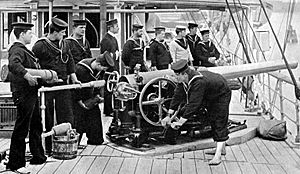BL 4-inch Mk I – VI naval gun facts for kids
Quick facts for kids Ordnance BL 4-inch gun Mk I – Mk VI |
|
|---|---|
 |
|
| Type | Naval gun |
| Place of origin | United Kingdom |
| Service history | |
| In service | 1880s – 190? |
| Used by | United Kingdom |
| Specifications | |
| Barrel length | Mk I 22.5cwt : 100 inches (2.540 m) bore (25 calibres) Mk II – VI : 108 inches (2.743 m) bore (27 calibres) 120 inches total |
|
|
|
| Shell | 25 pounds (11.34 kg) |
| Calibre | 4-inch (101.6 mm) |
| Breech | 3-motion screw |
| Muzzle velocity | Mk I 13cwt : 1,180 feet per second (360 m/s) Mk II – VI : 1,900 feet per second (580 m/s) |
| Maximum firing range | Mk II-VI 7,700 yards (7,000 m) |
The BL 4-inch gun Mk I – Mk VI was a group of powerful naval guns used by the British Navy. These guns were "breech-loading," meaning they were loaded from the back. This was a newer and faster way to load cannons back then. They were designed to be used on warships in the late 1800s.
Contents
The story of these guns shows how technology improved over time. Different versions, called "Marks" (Mk), were made to be better and safer.
Early 4-inch Guns
The very first 4-inch gun was called the 13 cwt Mk I. It had a short barrel, only about 60 inches long. Because of its short barrel, it could only shoot shells about 5,500 yards (about 5,000 meters).
Soon after, a longer version was made, called the 22.5 cwt Mk I. This gun had a barrel that was 100 inches long. It could shoot shells much farther, up to 7,200 yards (about 6,600 meters).
However, both of these early Mk I guns were quickly taken out of service. This happened after a similar, larger gun exploded on a ship called HMS Cordelia in 1891. The longer Mk I gun was still used for training purposes.
Improved 4-inch Guns
After the early problems, improved versions of the gun were developed. These were the 26 cwt Mks II - VI. They had even longer barrels, about 108 inches long. This longer barrel allowed them to shoot shells up to 7,700 yards (about 7,000 meters). These improved guns replaced the older Mk I versions on British warships.
Warships That Used These Guns
Many different types of warships were armed with the Mk II and later versions of the 4-inch gun. These included:
- HMS Inflexible: A large battleship that had its guns updated in 1885.
- HMS Bellerophon: Another battleship that was re-armed in 1885.
- Pygmy-class gunboats: Smaller ships launched around 1888.
- Redbreast-class gunboats: Gunboats launched in 1889.
- HMS Alexandra: A battleship that received these guns in 1891.
- Alert-class sloops: Sloop warships built in 1894.
By 1895, a new type of 4-inch gun, the QF 4-inch naval gun Mk I – III, started to replace these older BL guns.
Converted QF 4-inch Guns
A small number of these BL (breech-loading) guns were changed to become "QF" guns. "QF" stands for "Quick-Firing." This meant they could use the same cartridges as the newer QF 4-inch naval gun Mk I – III. These converted guns were given new names like Mk I/IV or I/VI, depending on which original gun they started as. After being converted, they could shoot shells even faster.
Surviving Examples
You can still see some of these old guns today!
- One gun from 1888 is at the Explosion! The Museum of Naval Firepower in Gosport, UK.
- Another gun, originally from HMS Gannet, is mounted on top of Calshot Castle. This castle is at the entrance to Southampton Water.
See also
- List of naval guns

